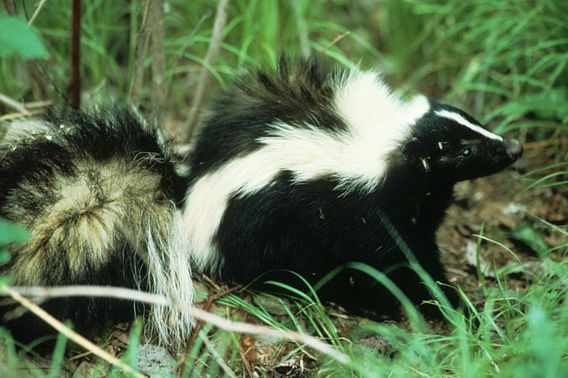
I was outside at dawn recently getting some chores done when I was hit with one of the smells of the country – a malodorous whiff left by a mammal in the mephitidae family.
It was the spray of a nearby skunk.
Skunks are not hibernators, but are mainly inactive in the winter, spending long periods of time in their den. Apparently one or more decided that our recent warmer weather was a good time to get out, stretch the legs and let out a little (E)-2-butene-1-thiol, 3-methyl-1-butanethiol, and 2-quinolinemethanethiol and the companion acetate thioesters – the three low-molecular weight thiol compounds or mercaptans that make up the offensive spray.
There was no sign of the skunk near the house, but skunk spray can be detected by a human nose up to 3.5 miles away. It can also be detected by a sleeping spouse at the far end of a mobile home.
The year was 1984 and my wife Sherry and I lived in a mobile home on her parent’s farm near Mindoro. Our vehicle was a 1976 Mercury Bobcat, purchased the year before for the steep price of $2,500 at an interest rate of 14 percent.
The Bobcat was lemon yellow, an unfortunate match for the reliability of the car, which spent lots of time at a local garage getting fixed. But it was all we could afford, as I was a full-time student and worked part-time in the sports department at the La Crosse Tribune.
Along with its unreliability, the car also was rusting out, including the floor. Instead of a sun roof with a view of the sky, I had a foot hole with a clear view of the roadway under my feet. To avoid doing a Fred Flinstone impersonation with my feet on the road, I wedged a couple of boards between the rusted out bottom and the carpet.
My temporary fix worked OK, except that I got a little wet when it rained. But that was nothing compared to an incident that occurred while I was driving home early one morning after working a night shift.
I was about three miles from home when a family of skunks dashed out in front of the car. I couldn’t swerve to avoid them and I wiped out several, sending them tumbling under the car and to that great skunk den in the sky.
I felt the sickening thumps under my feet and was immediately greeted by the skunks’ last living act of revenge – an emptying of their anal glands. I gasped, wiped my stinging eyes and rolled down the windows for the remainder of the trip.
I left the windows open when I pulled into the driveway and parked. I knew I smelled, but it was 2 a.m. and I was tired. I opened the door and took only a few steps before my essence filled the home and made it all the way to our bedroom at the other end.
I can’t remember the exact “welcome home honey” greeting I received, but it was probably something like “Oh my God, what is that foul stench?”, followed by some retching. I was ordered to go back outside, where I stripped to my skivvies and left my clothes outside. I took a long shower and it took most of the stink away.
That solved my fetidness, but what about the car? It was our only means of transportation.
The chemical way to neutralize skunk spray is through a combination of hydrogen peroxide, baking soda and dish soap – tomato juice does not work. Not having that knowledge and with Google still 14 years into the future, I tried an alternative method.
A dear great-aunt who has long-since passed had given me a bottle of Hai Karate cologne for Christmas the previous year. I was not much of a cologne wearing man, so the bottle was nearly full.
The cologne – which was priced higher than Aqua Velva or Old Spice – was launched with the slogan: “Be careful how you use it” and an ad campaign that had men using martial arts to fight off women.
I carefully poured the bottle of Hai Karate cologne on the floor of the Bobcat to fight off the stench. It certainly helped, but for a long time the car had a unique odor I believe was called Eau de Skunk.
That was my closest encounter with a polecat and I don’t want another one – a few whiffs in the wind is enough, thank you.
The Bobcat lasted another year before I sold it to a neighbor teen for the grand sum of $200 and he beat it up for a while before it blew an engine.
It was not a good return on our investment, but at least we didn’t get skunked.
Chris Hardie spent more than 30 years as a reporter, editor and publisher. He was nominated for a Pulitzer Prize and won dozens of state and national journalism awards. He is a former president of the Wisconsin Newspaper Association. Contact him at [email protected].
